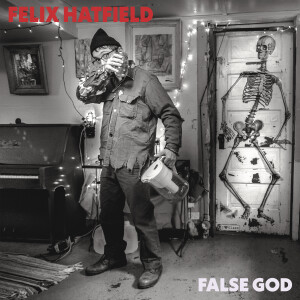 With a life list of influences that includes Pete Seeger, Ramblin’ Jack Elliott, Antonia Stampfel, Baby Gramps, Michael Hurley and more, Felix Hatfield checks a lot of the boxes on my list of important figures in folk music. Add to that a taste for the absurd and an affinity for trickster figures. Plus he was the instigator of the legendary Pacific Northwest jug band The Kitchen Syncopators, which never failed to draw a crowd of admirers that included me whenever they played the street corners at Seattle’s Northwest Folklife Festival in the 2000s. Hatfield, who has hitchhiked the country, landed in Eugene, played coffee houses, written songs in graveyards, now lives in a basement apartment in Portland, where he recorded this collection of songs from among the hundreds he has written.
With a life list of influences that includes Pete Seeger, Ramblin’ Jack Elliott, Antonia Stampfel, Baby Gramps, Michael Hurley and more, Felix Hatfield checks a lot of the boxes on my list of important figures in folk music. Add to that a taste for the absurd and an affinity for trickster figures. Plus he was the instigator of the legendary Pacific Northwest jug band The Kitchen Syncopators, which never failed to draw a crowd of admirers that included me whenever they played the street corners at Seattle’s Northwest Folklife Festival in the 2000s. Hatfield, who has hitchhiked the country, landed in Eugene, played coffee houses, written songs in graveyards, now lives in a basement apartment in Portland, where he recorded this collection of songs from among the hundreds he has written.
Hatfield is a remnant of the “old weird” Northwest, and his music – lyrics, delivery, arrangements and all – has that rough around the edges feel to it. His voice warbles and wobbles at times, kind of like Holy Modal Rounder Peter Stampfel’s (who just turned 82 this past week). His lyrics ramble around through imagery that’s at times surreal, at times absurdly specific. “I hear an echo in the canyon/I see the ghost of Leonard Cohen/The record spins and grins, I’m Your Man,” goes a typical verse in the opener “Seeing Things.” “Maybe you’re sick of me, and I’m sick of you, but somebody out there’s sick with the flu,” he intones in the next one, appropriately titled “Sick With The Flu.”
A bit of Ramblin’ Jack and a bit of Michael Hurley come through in the tenderly bruised “Train To London,” in which Hatfield pours out his heart in a couple of brief verses, accompanied by fingerpicked nylon-stringed guitar and little else but ambient seashore and highway noises. But to me Hatfield seems most like the rightful heir to the late great Jeffrey Frederick. For proof check out several numbers here, including “Nobody For Me,” a sad-sack love song like numerous of that type Frederick laid down with the Clamtones back in the ’70s. Here he’s accompanied by kindred spirit Jolie Holland and an anonymous chorus, plus a creatively tuned piano and a loosely arranged horn section of trombone, trumpet and a coupe of clarinets, giving the whole thing a Tom Waits-like, hoboes under the overpass feel to it.
Holland also sings harmony on the campfire love song “Walking Distance.” Another friend from the indie folk scene, Esmé Patterson, joins him on the lovely “That Kiss.” Mysterious characters, perhaps street people or just other wanderers he’s met in his travels, people various of these songs. One of these is “Unicorn Woman,” which in melody, lyrics and delivery is oddly off-kilter so as not to be out of place in a Baby Gramps setlist. (The title character also shows up in the opening track.) Hatfield uses a shambolic shuffle of a tune to paint a picture of a grandmotherly figure recalling “Her Crazy Days.” A starkly plucked banjo and vocally fried delivery add to the melancholy and troubling effect of the Appalachian style “Troubled Person.” RIYL Sam Amidon.
And there’s a bit of commentary on current (or at least recent) political happenings in a couple of tracks. The live recording of “Secret Society” is backed by a full band and chorus singing call-and-response style about the Skull and Bones student society at Yale – it would’ve fit right in at any of the Rounders family gatherings in Portland these past few years. And then there’s the surreally chilling “False God” that pokes carefully but humorously at a cultish leader or anything that we might wrongfully worship.
There’s a ton of creativity displayed by the backing musicians here, including whoever is playing the saxophones and clarinets of various sizes. The horns contribute a jazzy edge to several tracks, most especially that hopeful, melancholy “That Kiss.” And it’s all in the service of a unique and at times inscrutable vision. Which is what we want from our artists, right?
You can be entertained on Hatfield’s website and find his music on streaming platforms.
(Fangbite Records, 2020)
